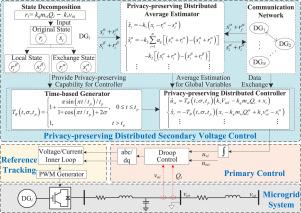为微电网提供具有预定义时间收敛性的隐私保护分布式二次电压控制
IF 10.1
1区 工程技术
Q1 ENERGY & FUELS
引用次数: 0
摘要
分布式二次控制被广泛应用于孤岛微电网的分级控制结构中。然而,分布式发电机(DG)之间交换的信息可能会被窃听者截获,从而导致隐私泄露甚至数据中毒攻击的风险,影响微电网的稳定性。现有的隐私保护分布式二次控制策略存在精度低、通信和计算开销大、收敛性差等问题。此外,还无法实现多总线电压调节和按比例无功功率共享的目标。为了克服这些缺点,我们创新性地设计了一种保护隐私的分布式平均估算器,根据状态分解法将包含隐私信息的状态分解为两部分。平均估算依赖于相邻 DG 之间的部分信息交换,从而避免了敏感信息的泄露。此外,针对状态分解产生的状态差导致收敛时间长的难题,设计了一种基于时间的生成器,以有效解决隐私保护水平和收敛时间之间的矛盾。在此基础上,提出了一种隐私保护型分布式二次电压控制,在保护微电网状态隐私的同时,在预定时间内实现平均电压调节和无功功率按比例分担,维持系统电压稳定,防止 DG 重载或轻载。最后,建立了一个用于孤岛微电网的硬件在环平台,并验证了所提控制策略的收敛性和隐私保护性能。本文章由计算机程序翻译,如有差异,请以英文原文为准。

Privacy-preserving distributed secondary voltage control with predefined-time convergence for microgrids
Distributed secondary control is widely used in the hierarchical control structure of islanded microgrids. However, the information exchanged between distributed generators (DGs) may be intercepted by eavesdroppers, leading to the risk of privacy leakage and even data poisoning attacks that affect the stability of microgrids. Existing privacy-preserving distributed secondary control strategies suffer from low accuracy, high communication and computational overhead, and the poor convergence properties. Moreover, the objectives of multi-bus voltage regulation and proportional reactive power sharing cannot be achieved. To overcome these shortcomings, a privacy-preserving distributed average estimator is innovatively designed, where the states containing privacy information are decomposed into two parts based on the state decomposition method. The average estimation relies on the partial information exchange between neighboring DGs, thus avoiding the leakage of sensitive information. Furthermore, to address the difficulty that the state difference generated by the state decomposition leads to a long convergence time, a time-based generator is designed to effectively resolve the conflict between the privacy-preserving level and the convergence time. On this basis, a privacy-preserving distributed secondary voltage control is proposed, which preserves the privacy of the microgrid states while achieving average voltage regulation and proportional reactive power sharing within a predefined time, maintaining the system voltage stability and preventing the DGs from being heavily or lightly loaded. Finally, a hardware-in-the-loop platform for an islanded microgrid is built and the convergence and privacy-preserving performance of the proposed control strategy is verified.
求助全文
通过发布文献求助,成功后即可免费获取论文全文。
去求助
来源期刊

Applied Energy
工程技术-工程:化工
CiteScore
21.20
自引率
10.70%
发文量
1830
审稿时长
41 days
期刊介绍:
Applied Energy serves as a platform for sharing innovations, research, development, and demonstrations in energy conversion, conservation, and sustainable energy systems. The journal covers topics such as optimal energy resource use, environmental pollutant mitigation, and energy process analysis. It welcomes original papers, review articles, technical notes, and letters to the editor. Authors are encouraged to submit manuscripts that bridge the gap between research, development, and implementation. The journal addresses a wide spectrum of topics, including fossil and renewable energy technologies, energy economics, and environmental impacts. Applied Energy also explores modeling and forecasting, conservation strategies, and the social and economic implications of energy policies, including climate change mitigation. It is complemented by the open-access journal Advances in Applied Energy.
 求助内容:
求助内容: 应助结果提醒方式:
应助结果提醒方式:


